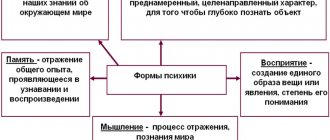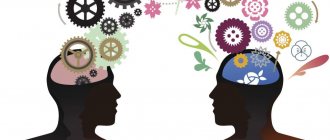Save article:
The article explains:
- The value of professional personal development
- 7 stages of professional personal development
- Professional strain and burnout
- Recommendations for independent professional development of personality
Professional personal development is one of the important criteria for personnel evaluation.
A high-quality education gives a start to a career, but it is the employee who is constantly striving to improve his abilities that is valuable. In fact, such a specialist can confidently be called a company resource. Professional development of an individual occurs gradually, and along this path one cannot do without certain obstacles. If a person is able to view his mistakes as important experiences, he will be able to use them in his future career. We will talk in more detail about professional personal development later.
The value of professional personal development
The desire for professional development is an excellent quality for any person who wants to be a sought-after specialist and perform their duties well. No matter what heights we reach, there are always areas in which we can improve, increasing our knowledge base.
Professional personal development is not always about careerists who dream of high positions and huge salaries. You can develop in your business not only vertically, but also horizontally, becoming an indispensable specialist in your field of knowledge.
The value of professional personal development
That is, not only the head of a production department or a businessman, but also a plumber, psychologist, carpenter, etc. can learn new skills. New education, advanced training courses, and simply reading professional literature expand your horizons, allow you to look at your business differently, and see new opportunities where they were previously absent.
Professional development and personal self-development go hand in hand. Any progress affects different areas of a person’s life. By improving his qualifications, he becomes more self-confident and looks into the future more optimistically.
And, of course, keeps up with the times. Any knowledge becomes outdated. It is impossible to use information received at an institute or some other educational institution all your life, because the world does not stand still. Knowledge needs to be constantly layered on top of each other: below is a base, a professional foundation, and on top are layers of experience and new skills.
Free online intensive
Your Path to IT starts here
More details
By engaging in self-improvement, we gain new experience that helps us cope with everything that happens in life. This experience can be different, not only positive. However, in any case, it strengthens us and gives us the opportunity in the future to competently solve questions that previously had no answers.
The beginning of life's journey
During the first years of life, certain skills are formed, the child learns more and more new techniques, reaching a certain level of development in one direction or another.
Gradually, one type of activity replaces another, but the previous stage cannot be considered separate and not related to future development. This is always a “superstructure” on previous experience.
Thus, activity runs like a “red thread” along a person’s life path, shaping and improving it.
Professional strain and burnout as a side effect
Professional development of an individual as a process is not always stable and can also be of a descending nature. It can be negatively affected by such phenomena as professional deformation or mental burnout.
Professional deformation refers to personality changes that are caused by a person’s professional activities. As a rule, they are persistent and extend to all aspects of the physical and mental organization of a person. Basically, professional deformation is viewed in a negative light - as a phenomenon that makes it difficult for a person to communicate with others and even reduces the efficiency of his work.
Occupational deformities
The mechanism of occurrence of professional deformation has quite complex dynamics; negative changes begin to slowly but surely take hold both in professional and in everyday activities. At first these are only temporary negative mental states, then they begin to crowd out positive qualities. Negative qualities completely replace positive ones, the personality seems to be built anew, distorted, deformed.
Professional deformation affects different aspects of the personality: motivational, cognitive, emotional. As a result, a person may develop specific attitudes and ideas. In addition, even new personality traits often arise. Let’s say that if the deformation manifests itself in the motivational sphere, a person becomes incredibly passionate about his profession to the detriment of other areas of his life.
If the cognitive sphere is affected by deformation, this is often the result of a very narrow specialization in any area of the profession. In this case, a person is interested only in those issues that can help him in his work, take him to a new professional level, and make it easier to complete tasks. At the same time, he may know absolutely nothing about what is beyond the scope of his professional competencies.
Concept of activity
Activity is considered the basis for the development of a person as an individual, the main factor in his existence as a social being.
Mastering an activity, its complication, and improvement is an important condition for the development of the human nervous system. To solve educational problems, it is necessary to be based on psychological patterns and the dynamics of human activities. When carrying out educational actions, it is necessary to take into account the nature of various types of activities, their features, meaning, content and volume. The concept of personality and activity in Russian psychology are considered as interconnected phenomena. When developing the problem of activity and activity of the individual, modern psychology is based on the idea of the functional nature of reflection, the origin of consciousness from work activity, and the leading role of work in human behavior and activity. The source of activity is called, first of all, needs. It is needs that push a person to search for means to satisfy it, which entails active activity.
Are you an expert in this subject area? We invite you to become the author of the Directory Working Conditions
Based on their origin, needs can be divided into natural and cultural, and are characterized by the following indicators:
- any need has its own object, that is, it is continuously an awareness of the need for something.
- any need receives a certain content depending on the criteria and methods of its satisfaction.
- the need has the ability to be reflected.
- needs are expressed in motives, that is, in some incentives for activity.
Each type of activity has its own special motives.
What is personality formation
Personality formation is a complex process that is not interrupted at any stage of human life. Simply put, it is infinite. The very concept of “personality” is very multifaceted, and there are two popular professional views on this phenomenon. One of them says that the formation of a child’s personality depends on natural innate data. The second opinion indicates that personality is a social phenomenon, and only society influences its formation.
In fact, the entire period of a person’s life, from birth to adulthood, is a process of personal growth or degradation. It is believed that development occurs in activities that are significant to the individual. The driving force can be called internal contradictions between the needs of a growing child and the real possibility of their implementation. The child’s activities are almost always determined by the parents and, to one degree or another, directed by them. Conclusion: the process of upbringing is the leading factor in the formation of a child’s personality.
Personality education and characteristics of age stages
In psychological science, the problem of personality development and education is quite relevant. This is connected both with the social aspects of society and with biologically determined processes.
At different time periods, either a theory in which biological significance in the process of personality development was a priority, or a social theory, according to which personality is formed under the influence of society, came to the fore.
Domestic psychology, as the main driving forces of personality development, has put forward a theory about the significance of obstacles to “growing up.” Such obstacles are called crises, through which a person receives a certain new formation and the ability to move to a new level of development.
A prominent representative of this approach is L.S. Vygotsky. It was he who introduced into developmental psychology the concept of the zone of proximal development and the significance of age-related crises. In his theory, a significant role was assigned to age periodization and the specificity of each period.
In order for the development of a child’s personality to proceed harmoniously and as efficiently as possible, those around him must know the characteristics of each age stage and be able to identify possible developmental deviations in time, because psychological age often does not coincide with calendar age.
Preschool period
Preschool children are curious and active. Their main activity is play.
In the first stages, the child requires the help of an adult, his participation and support. It is during this period that an important development mechanism manifests itself - imitation. A small personality strives to repeat the behavior of those around him in everything. Most often, parents and close circle are subject to “copying”.
At this age, the child does not yet have and does not know how to express his opinion, he has not developed an empathy feedback mechanism, so imitation of an adult is precisely in the nature of repetition, and repetition of actions or words of a different nature, both positive and negative.
School period
School-age children and teenagers are already able to distinguish between the positive and negative aspects of adult behavior. They are more independent, their intellectual level is at a higher level. In addition, the formation of critical thinking plays an important role at this stage of development.
Read more: Developing critical thinking
In adolescence, the activity of cognitive activity is quite high, so it is important that at this stage of development the child has as many positive examples of development as possible, otherwise an impressive negative experience can become a decisive factor in the line of personal development.
The activity of a preschooler as a whole comes down to learning to serve himself independently and preparing for school. At this stage, the emergence and improvement of speech skills, as well as the ability to think and draw logical conclusions, becomes an important new development.
Already in this period, children are able to carry out simple work assignments for adults, as well as master primary skills of behavior in a social environment.
Gradually, play activities begin to be replaced by educational activities. At primary school age, speech skills deepen, knowledge appears, which the child perceives not only from a personal position, but also from the side of the team. Independence of behavior is being formed. Younger preschoolers tend to be actively involved in work activities, because they already understand its importance and necessity.
During adolescence, activity levels reach almost maximum levels. The desire for knowledge increases significantly against the background of progressive mental development. Teenagers are inquisitive and focused on the future. However, a positive attitude must be supported by positive factors. Otherwise, there is a high probability that the perception of the surrounding world and activities will be formed in a distorted form.
Period of adolescence
The period of adolescence is aimed at friendships, their formation and strengthening. At this age, a person is characterized by persistent strong-willed qualities, aspirations to master and improve himself in the profession and the desire to meet a life partner.









